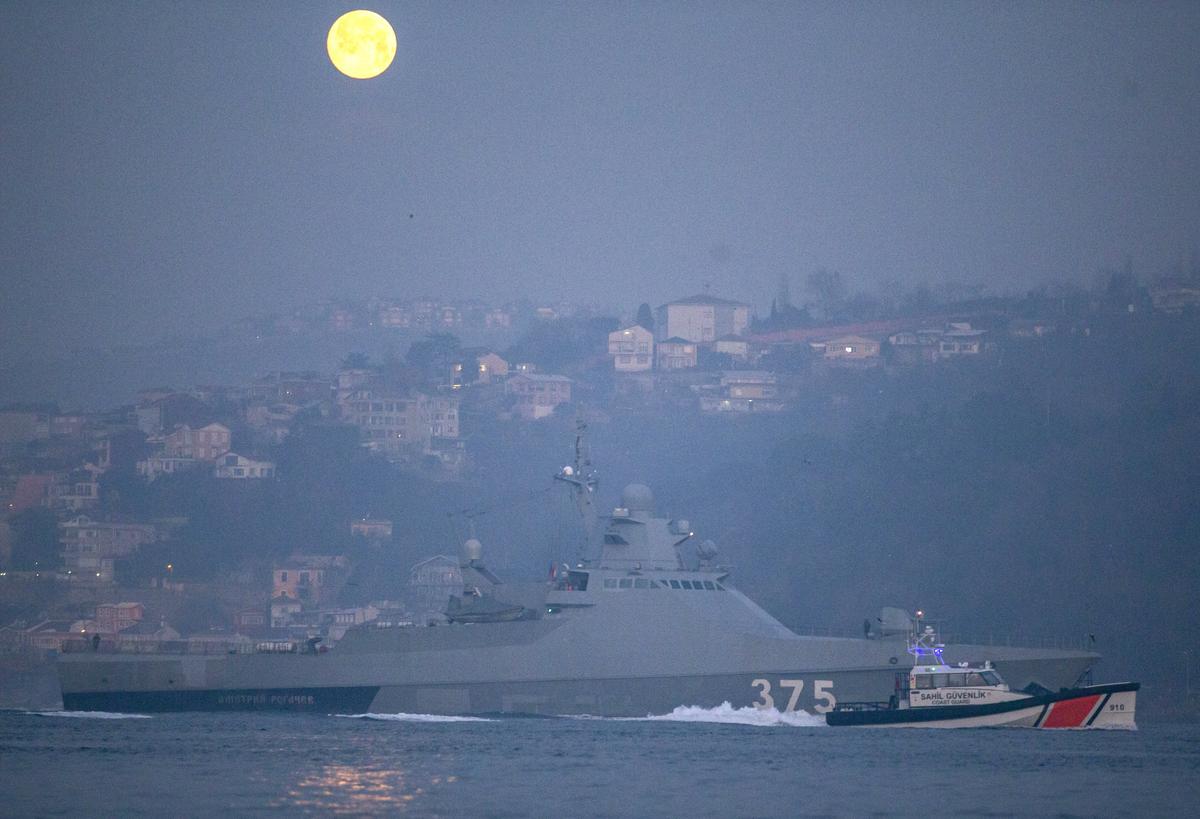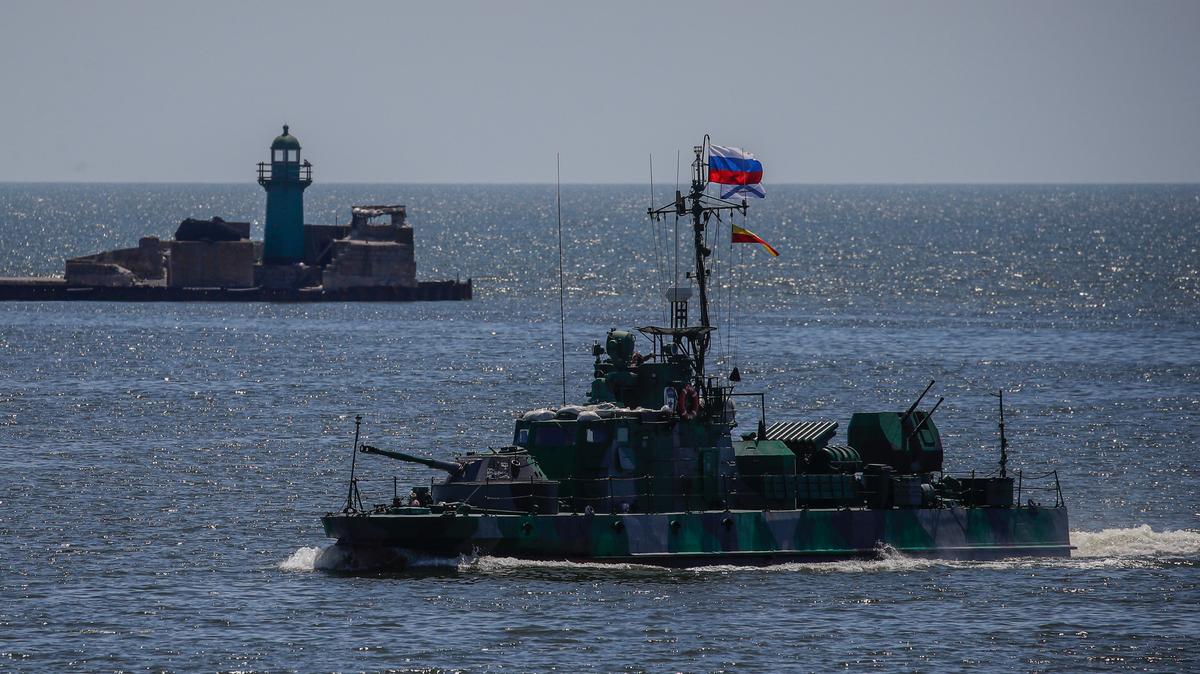Vladimir Putin’s vision of restoring Russia to its rightful place as a global power has long rested on dominating the Black Sea and projecting power in the Mediterranean and the Middle East. In the years before Russia’s full-scale invasion of Ukraine, Putin largely succeeded in that goal.

Galip Dalay
Senior consulting fellow at Chatham House and senior fellow at the Middle East Council on Global Affairs
With the occupation of the Georgian secessionist region of Abkhazia following a brief war in 2008, Russia gained control of roughly two-thirds of Georgia’s Black Sea coastline. In 2014, Russia illegally annexed the strategically important Crimean Peninsula, shifting the power balance in the Black Sea and increasing the Kremlin’s influence in the Western Balkans and the South Caucasus.
Around the same time, in 2013, Russia established its Mediterranean Squadron, with its Black Sea Fleet mainly providing the necessary ships and logistics to gain a stronger foothold in the Middle East and North Africa. In 2015, the Russian military intervened in Syria and later began to support rebel commander Khalifa Haftar in the Libyan civil war.
Since then, Russia has upgraded its previously modest Tartus naval base in Syria to accommodate larger ships, expanded its Hmeimim air base in Syria’s Latakia province, and taken control of Libya’s Al Jufra air base, an important hub for the Kremlin’s Africa operations.
Given that Russia’s naval presence and power in the Mediterranean hinges on the strength of its Black Sea Fleet, the war in Ukraine’s strain on Russian resources has had a ripple effect.
Putin was able to build a strong Russian presence in the Mediterranean — a long-held dream, dating back to imperial times — because Russia had tightened its grip on the Black Sea and was able to move assets at will between the two regions. As a result, the Black Sea and the Mediterranean merged into a single geopolitical space, with increasingly intertwined security dynamics.
But the war in Ukraine has undermined Russia’s capacity to project power and looks set to redefine its role in the Black Sea and the Mediterranean. And while the Kremlin has thus far largely maintained its role in regional politics and ties with Middle Eastern leaders, which it sees as a manifestation of its great-power status, a festering conflict in Ukraine, together with the Gaza war, could ultimately alter Russia’s geopolitical identity in the region. Without a total victory in Ukraine, Russia’s influence in the Black Sea, the Mediterranean, and the Middle East will likely decline over time.

A Russian naval vessel enters the Bosphorus accompanied by a Turkish Coast Guard boat, Istanbul, Turkey, 16 February 2022. Photo: EPA-EFE / ERDEM SAHIN
Given that Russia’s naval presence and power in the Mediterranean hinges on the strength of its Black Sea Fleet, the war in Ukraine’s strain on Russian resources has had a ripple effect. Ukraine has disabled or destroyed approximately one third of Russian warships in the Black Sea. Moreover, since Turkey closed the Bosphorus and Dardanelles straits to warships in February 2022, the Kremlin has been unable to rotate naval assets between the two regions.
The war in Ukraine has also forced Russia’s military-industrial complex to focus primarily on meeting the country’s own needs, rather than exporting its weaponry. This suggests that the Kremlin’s future military interventions in the Middle East will resemble its low-cost, high-impact strategy in Libya, rather than its more resource-intensive campaign in Syria.
Consumed by its own crisis, Russia no longer has the clout or the bandwidth to mediate regional conflicts, as it did with the Astana meetings and Sochi summits on Syria.
Of course, it doesn’t help that Russian weaponry has arguably performed poorly on the battlefield in Ukraine. Such lacklustre performance could reduce interest in Russian arms in the region and elsewhere. More importantly, a weakened Russian defence industry — which has traditionally tethered other countries to Russia’s interests — would further weaken the Kremlin’s influence.
Russia’s leverage over Middle Eastern countries has already declined, while the Kremlin’s dependence on Middle Eastern states has increased, including on Iran, a regional power whose drones have played a crucial role in Moscow’s campaign against Kyiv. Consumed by its own crisis, Russia no longer has the clout or the bandwidth to mediate regional conflicts, as it did with the Astana meetings and Sochi summits on Syria.
The Gaza war, too, is challenging Russia’s claim that it can balance different players in the Middle East. The war has driven a wedge between Russia and Israel, while Russia’s relations with Iran and its regional axis have deepened. The Kremlin is trying to capitalise on the Global South’s growing disillusionment with Western support for Israel’s invasion of Gaza to justify its invasion of Ukraine and build support for its confrontation with the West.
Indeed, the Global South has become a major narrative battleground between Moscow and the West, where the latter is losing ground amid the Gaza war. Russia’s current geopolitical identity in the region increasingly resembles that of the Soviet era, when it supported Arab states against Israel and revolutionary Arab states against more conservative ones.
If the war in Ukraine carries on, and Russia’s position in the Black Sea continues to weaken, its influence in the Mediterranean will also wane.
But the parallels don’t stop there. During the Cold War, Soviet power in the Middle East was arguably at its zenith in the early 1970s. But soon after it began to fade, with Egypt’s expulsion of Soviet military personnel in 1972 marking a major turning point that heralded its switch to the US-led Western camp. It could be argued that the Kremlin’s influence in the region peaked in the years before it launched its invasion of Ukraine.
If the war in Ukraine carries on, and Russia’s position in the Black Sea continues to weaken, its influence in the Mediterranean will also wane. As NATO and the European Union devise a containment strategy for Russia, they must remember that an effective Black Sea policy requires an effective Mediterranean policy, and vice versa. In the confrontation between Russia and the West, the two regions are an integrated strategic domain.
This article was first published by Project Syndicate. Views expressed in opinion pieces do not necessarily reflect the position of Novaya Gazeta Europe.
Join us in rebuilding Novaya Gazeta Europe
The Russian government has banned independent media. We were forced to leave our country in order to keep doing our job, telling our readers about what is going on Russia, Ukraine and Europe.
We will continue fighting against warfare and dictatorship. We believe that freedom of speech is the most efficient antidote against tyranny. Support us financially to help us fight for peace and freedom.
By clicking the Support button, you agree to the processing of your personal data.
To cancel a regular donation, please write to [email protected]

